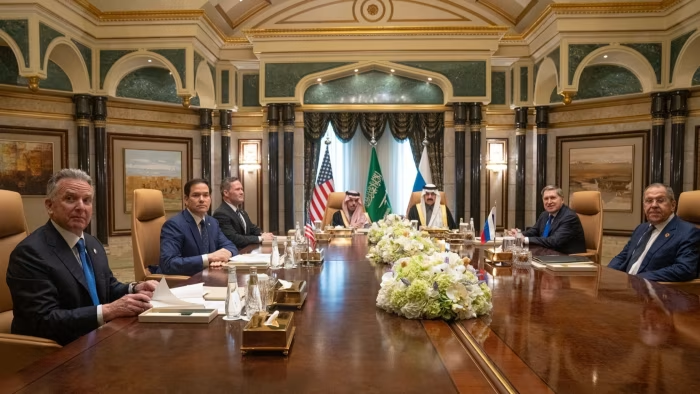Russia and the United States have agreed to “lay the groundwork for future cooperation” aimed at strengthening bilateral relations and ultimately resolving the ongoing conflict in Ukraine. This agreement follows the first high-level discussions about the war since the early days of President Vladimir Putin’s invasion.
The negotiations took place in Riyadh on Tuesday and extended over four-and-a-half hours. The U.S. State Department announced that both nations would appoint “high-level teams” to pursue an end to the war and establish a diplomatic channel for addressing various bilateral issues. U.S. National Security Adviser Mike Waltz emphasized the importance of achieving a lasting resolution: “This needs to be a permanent end to the war and not a temporary cessation as we’ve seen in the past.”
Waltz, who was accompanied by Secretary of State Marco Rubio and President Donald Trump’s special envoy Steve Witkoff, noted that discussions would inevitably involve sensitive topics such as territorial disputes and security guarantees. “Those are just fundamental basics,” he remarked, adding that Trump was “determined to move very quickly” on these matters.
However, the Riyadh talks have raised alarms in Kyiv and among European leaders, who fear that Trump may be inclined to settle the conflict on terms favorable to Putin. On the same day, Russia appeared to adopt a more rigid stance, as its foreign ministry ruled out any role for Europe in the Ukraine discussions and demanded that NATO rescind its open-ended invitation to Ukraine, originally extended in 2008.
Ukrainian President Volodymyr Zelenskyy expressed his surprise at the U.S.-Russia negotiations and indicated that he had rescheduled a planned visit to Saudi Arabia to accommodate the talks. “We don’t want a peace brokered behind the scenes without our involvement,” Zelenskyy stated, emphasizing that “without Ukraine, peace cannot be achieved.”
In a statement that mirrored sentiments from the Russian side, the U.S. State Department indicated that the newly established diplomatic channel would “lay the groundwork for future cooperation” on mutual geopolitical interests and potential economic opportunities that could emerge from a successful resolution of the conflict in Ukraine.
Russian Foreign Minister Sergei Lavrov reported that both countries had agreed to “ensure the prompt appointment of ambassadors to each other’s capitals,” aiming to eliminate obstacles put in place by the previous Biden administration. These barriers included the expulsion of diplomats and issues concerning the seizure of Russian property and banking transactions. Lavrov noted that “our deputies will soon arrange a meeting to assess the need for removing these barriers.”
While the discussions were characterized as constructive, questions remain about the concessions Russia might be willing to make. Rubio stated that any such steps would arise from “hard, difficult diplomacy” conducted in “closed rooms over a period of time.” He insisted, “No one is being sidelined here,” adding that the European Union would eventually need to be involved due to the sanctions they have imposed.
During an emergency summit convened to formulate a unified response to the U.S.-Russian talks, European leaders expressed differing views on the prospect of deploying peacekeeping forces to Ukraine. While the UK showed willingness to send troops, countries like Germany, Italy, Poland, and Spain expressed hesitation. The Russian foreign ministry responded by stating that Moscow was “categorically opposed” to any European peacekeeping deployment.
Waltz confirmed that the U.S. was engaging in “shuttle diplomacy,” having consulted with Zelenskyy and French President Emmanuel Macron, and noted that Trump is scheduled to meet with UK Prime Minister Keir Starmer next week. He rejected the notion that U.S. allies had not been consulted regarding these talks.
The Riyadh meeting marked the first of its kind between the U.S. and Russia since Moscow’s invasion of Ukraine in 2022. The sight of Russian and American flags displayed side by side outside the ornate venue underscored the extraordinary nature of the discussions. This development follows Trump’s recent outreach to Putin in an effort to expedite a resolution to the conflict—an initiative taken without prior consultation with Ukraine or its European allies.
As the talks continue, Kyiv has made it clear that it will reject any agreements imposed without its involvement. Meanwhile, European nations find themselves scrambling to regain a place at the negotiating table. As Zelenskyy emphasized in his discussions with Turkish President Recep Tayyip Erdoğan, the need for Ukrainian participation in any peace process is imperative.
In summary, while the recent U.S.-Russia talks represent a potential turning point in diplomatic relations, numerous challenges remain. The path toward a sustainable resolution of the Ukraine conflict is fraught with difficulties, and the involvement of Ukraine and European allies will be crucial in shaping the outcome. Both sides must navigate their differences carefully to create a framework that ensures lasting peace and stability in the region.



